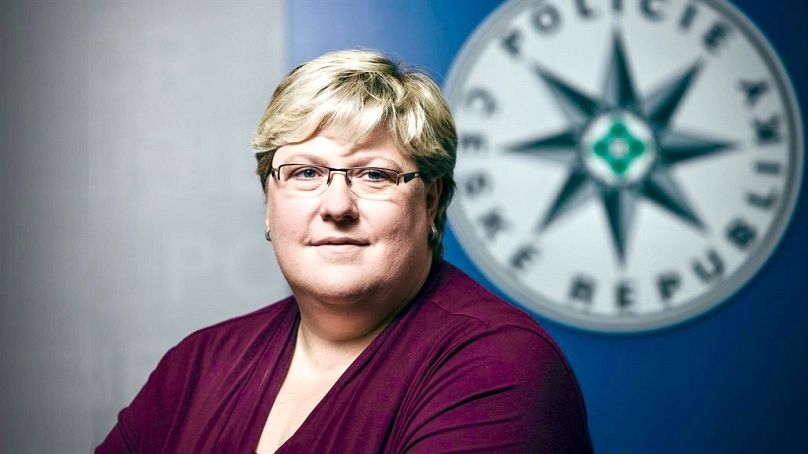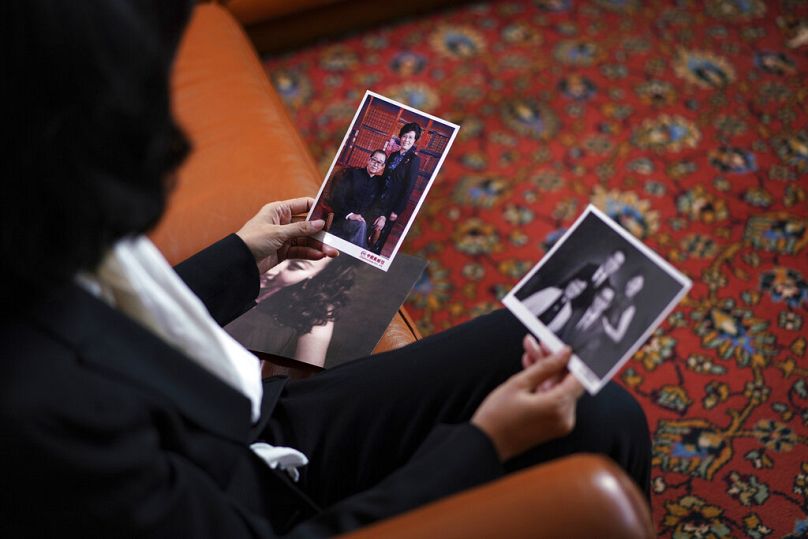'You can't buy respect,' said the Czech candidate for Interpol president, Sarka Havrankova, about her rival UAE candidate, Ahmed Naser Al-Raisi.
Sarka Havrankova was a case officer at Interpol’s national central bureau in Prague when the Czech police were asked to help in the investigation of Marc Dutroux, the Belgian serial killer and rapist who was wanted for the kidnap, torture and murder of young women and girls.
Dutroux, who was convicted on all charges in 2004, kidnapped and held his victims in a dungeon in the basement of his home in a case that shocked Europe. Belgian police also investigated whether Dutroux had committed crimes in the Czech Republic and Slovakia.
Ultimately, the link to the Czech Republic was never proven by the Belgian police, which was heavily criticised for the investigation, which led to mass street protests. But for Havrankova - and likely every officer who worked on it - the case left a lasting impression.
“It was difficult,” she recalls. “I was young and as a woman, it was sensitive, to see what can be done to young children, how they are treated.”
It was one of Havrankova’s first cases at Interpol and 26 years later -- as a vice president at the organisation -- she is now running to replace South Korea’s Kim Jong Yang as president in 2022.
Her rival is an Emirati general, Ahmed Naser Al-Raisi, who has been linked to the torture of high-profile political prisoners in the United Arab Emirates, including Ahmed Mansoor, an Emirati dissident, and Michael Hedges, a British academic that was accused of spying in 2018 and sentenced to life imprisonment. Hedges was later pardoned, but Mansoor remains in jail.
Al-Raisi’s candidacy has already led to a storm of protest in Europe. French lawmakers have appealed directly to President Emmanuel Macron to intervene. German MPs have claimed that his nomination contradicts the Universal Declaration on Human Rights. Meanwhile, rights groups have argued that his election would seriously damage the standing of Interpol internationally.
The UAE has been accused of attempting to buy influence within Interpol in order to grease the wheels for al-Raisi’s candidacy, according to a recent report by Sir David Calvert-Smith, the UK’s former director of public prosecutions. In 2017, the UAE made a €50m donation to Interpol's Foundation for a Safer World, a non-profit organisation with offices in Geneva that Calvert-Smith describes as "a channel by which to funnel cash from the UAE government into Interpol".
Indeed, despite its global remit, Interpol has always been strapped for cash, and donations typically make up more than 50% of its annual budget. In 2020, for example, its operating budget was €136m, with €60m coming from statutory contributions from member states (calculated according to the economic weight of the country) and the remaining €76m in 2020 coming from voluntary donations.
In 2020, the largest single donation (€7.8m) was from the European Commission and the second largest from the Interpol Foundation (€6.1m). Canada, Norway, Japan and Qatar also contributed, often for specific programmes such as cybercrime (Japan) or security in sport (Qatar).
Asked about the allegations against al-Raisi personally, Havrankova said she had no other information than what has appeared in the media, but that she is concerned by it.
"I am a police officer and it is impossible to ignore the allegations of very serious crimes faced by one of our colleagues. It may lead to a loss of trust in our organisation.”
As for the UAE's financial contributions to Interpol in recent years, she told Euronews: “You cannot buy respect. You have to gain it by your actions. Interpol should not be politicised, and wealth should never influence matters of law enforcement."
"Money, wealth, or political power of the country should never affect the independent performance of the police. If we allow it, as police officers, we must understand that we deny our mission," she said.
Euronews has reached out to the government of the UAE for comment.
Scandal
This is not the first time that the leadership of Interpol -- an organisation made up of 194 member states and that aims to facilitate cooperation between police worldwide -- has been tinged with scandal.
It is not even the second or third time.
Back in 2008, President Jackie Selebi -- from South Africa -- had to resign after allegedly taking $170,000 in bribes from a drug dealer. Interpol said it was not linked to his work with them, but to his time as a police commissioner in South Africa. He was later sentenced to 15 years for corruption.
In 2017, Interpol President Meng Hongwei disappeared during a visit to China. His family remains in France and his wife told AP recently that Interpol “was of no help at all” when her husband vanished.
In 2020, Meng was convicted of bribery in China and jailed for 13 years.
Asked about Meng, Havrankova said: “I have no information on this other than what I read in the media. I think it is the general secretariat that should answer that question.”
Then in 2018, it had looked as though Russia's Alexander Prokopchuk was going to be elected to replace Meng. His candidacy had been widely criticised, with a bipartisan group of US Senators complaining that it would be "putting a fox in charge of the henhouse." Lithuania and Ukraine both threatened to withdraw from Interpol if Prokopchuk was elected.
When it came to a vote, Prokopchuk lost to South Korea's Kim by 101 to 61 votes, prompting Moscow to complain that the election was subject to "unprecedented pressure and interference".
As an organisation, Interpol -- which is based in Lyon, France -- includes 194 members, from democracies to theocracies to autocratic dictatorships.
On the one hand, it is European-based and reliant on European funding.
But when it comes to the presidential election -- held every four years -- every nation has the same single vote.
As such, it has not been immune to the growing divide in international relations between liberal and illiberal states, between democracies and autocracies. In 2018 this dichotomy pitted the autocratic Kremlin against democratic South Korea. In 2021, the same battle is being fought again: with an EU member state on one side and the anti-democratic UAE on the other.
"This is the most crucial election since the adoption of the Interpol constitution in 1956. The outcome of this election will either question the credibility and integrity of Interpol or reintroduce a return to core police values," Havrankova said.
"The organisation's reputation and legitimacy have been undermined in the past and cannot afford to be fractured again."
Seeing red
Even outside of election season, Interpol's critics allege that autocratic and anti-democratic states are using the organisation to wage their own wars on dissent and to harass and punish their enemies.
Russia is responsible for issuing 40% of the thousands of Interpol ‘red notices’ that are issued each year, according to a report by Freedom House.
A red notice can lead to the arrest and detention of suspects anywhere in the world and has become an important tool for nations looking to track down fugitives. Although each is considered by a task force within Interpol before being issued, Interpol says, there have been many cases of abuse.
Just as each nation in Interpol has an equal vote, so each has the same right to request a red notice, whether they are a liberal democracy with an established rule of law or a violent dictatorship.
Moscow has previously tried to issue red notices against former tycoon Mikhail Khodorkovsky and Kremlin-critic Bill Browder, although Interpol has refused the requests.
China has used the red notice system to harass Uyghur activists, rights groups claim. As recently as September 2021 Interpol cancelled a red notice for an Uyghur diaspora figure who was arrested in Morocco and had been living in Turkey since 2012 and was flagged as a terrorist by Beijing.
Meanwhile, Turkey has used the system to crack down on critics of President Erdogan since a failed coup in 2016, prompting a rebuke of Ankara and abuse of the red notice system by Chancellor Angela Merkel. Turkey hosts the election ceremony this week at which Erdogan is due to speak.
An Interpol spokesperson said that since the coup attempt in Turkey, "the general secretariat has received and denied more than 700 red notice requests for members of the Gülen movement".
In 2020, over 11,000 red notices were issued but only a fraction of these are made public and Interpol does not provide a breakdown by country.
An Interpol spokesperson told Euronews that she could not reveal how many red notices had been cancelled in 2020 but that Interpol's constitution forbade any "intervention or activities of a political, military, religious or racial character".
Havrankova, perhaps unsurprisingly given her two-and-a-half-decades at Interpol, is reluctant to criticise the red notice system. But she says that a general increase in transparency and information sharing between global police forces are among her main priorities.
Bridging the gap
That will include bridging the gap between the member nations of Interpol and the executive committee, she said, and ensuring that all 194 countries are represented by increasing the number of police officers that are seconded to the organisation.
That, she said, will help bridge the divide between scores of members with very different justice systems and priorities.
“The most important thing is to ensure consensus-based decision making because I fully understand that with 194 countries you can always find differences [of opinion]. But I think that is mainly about enhancing communication between the executive committee and the member countries,” she said.
If elected, Havrankova will be only the second woman to hold the position and though she says her gender has not held her back in the Czech police, she knows that in many police departments it would have. Interpol’s executive committee has only two women and 11 men.
“I come from a quite progressive country. I have never personally faced any obstacles relating to my gender. But when you look at the statistics, they prove that there is no gender balance and fair representation of women within the law enforcement executive positions in many countries, including Interpol,” she said.
“So I believe my candidacy is a strong and clear signal to all my female police colleagues in all the regions around the globe.”













